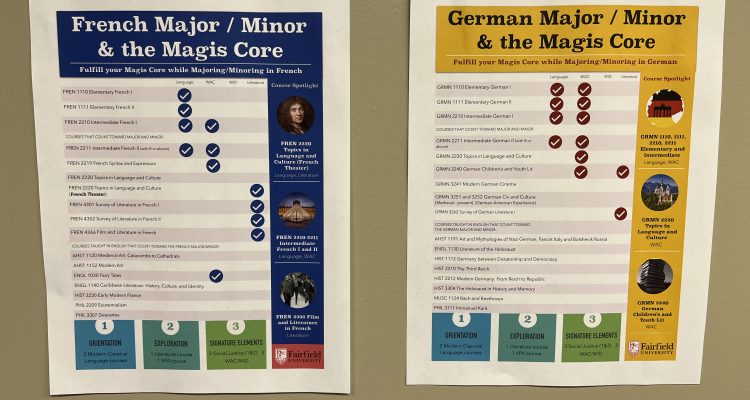It’s that time of year again. When we all pull up our degree evaluations, and devote a significant amount of brain-space to trying to figure out what we’re going to take in the fall. I’ve over-thought it more than most. I’m guessing at this point I’ve set some kind of record for the number of “what if” scenarios processed in a single registration season. And now, I’ve got some wisdom to share. I’m going to let you in on a little secret. You can get a new minor, and you barely have to try.
Now that might sound a little far-fetched, but stick with me here.
I’ve heard plenty of students complain about the Magis Core requirements in my time at Fairfield. And I understand the frustration. I’m going into my senior year and I can’t find a single course with a Social Justice 2 attribute that overlaps with any of my three majors or two minors. We’ve all had our moments of picking one class over another we would have preferred just to get an attribute over with. The core curriculum can have its challenges.
But that doesn’t mean you can’t make it work for you.
If you take a scroll through the Fairfield University course catalog it will quickly become apparent that we have a massive volume of minors offered here. Some of them are going to require you to commit to 15 credits of coursework in the same department. But many have course offerings that span the majority of the College of Arts and Sciences, and some even go beyond that into courses offered in the Egan School Of Health Studies or the Dolan School of Business. With just a little bit of strategy these interdisciplinary minors are going to become your best friends.
The Magis Core requirements are meant to produce students with a well-rounded liberal arts background. As such, they span a variety of disciplines. On the surface, they may not seem easily connectable, but many of them are. The 1000-level Religious Studies and History requirements, as well as the 2000-level History, Religious Studies, Philosophy, Literature, and Visual and Performing Arts courses provide more than enough credits to put together a minor. All that’s required is a little bit of strategy.
The world language minors, such as German, French and Italian all have electives that span the History, Philosophy and English departments. They also allow you to count your second level language course (a possible tier one core element) towards these minors. As long as you make sure to take classes that come with these attributes you could finish nearly the entire major doing only things that also count towards the core.
The American Studies Minor only requires one course that you can’t also count for an attribute. Other than that it is simply four courses from a variety of departments that carry the American Studies attribute. The only extra thing you would have to do is take Roots of American Culture, a single 1000-level course. American Studies is one of the most common attributes for classes in CAS to have, all the humanities and social sciences departments have American Studies course offerings. The chances are good that if you have a major or another minor in CAS you’ve already taken an American Studies course without even realizing it.
Women’s, Gender and Sexuality Studies is another simple interdisciplinary major that spans a variety of departments. The only required course that you can’t make overlap with the core is the Capstone Seminar, and even that also has a Peace and Justice Studies attribute so you can easily overlap it with another minor. There are also a variety of courses that double-dip as both Women’s, Gender and Sexuality Studies and American Studies courses, or that overlap with other programs as well.
The Health Studies minor requires both an introductory course and a capstone project. However, it manages to span STEM, social science, and humanities disciplines in its scrollable list of acceptable electives. If you have a major in CAS or any of the Health Studies fields something in your required coursework will likely already overlap. And it will absolutely overlap with courses you can take for the core.
The Magis Core curriculum is not your enemy here at Fairfield University, it’s an excuse to broaden your horizon. We need to rethink the narrative that the core is just a bunch of stand alone courses that have nothing to do with the pursuit of our degrees, and start thinking of the core as a way to find a new minor to complement your main program of study. All of these minors have great faculty and a lot to offer you as a student. Not to mention they will make you a more well-rounded candidate when you go to apply for jobs.
It’s time for us all to stop resenting the Magis Core, stop thinking of it as a waste of your time here, and start making it work for you.


Leave a Reply